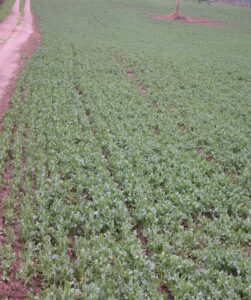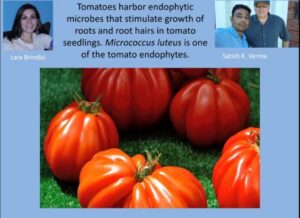- February 28, 2021
- Blog, Production
- Posted by Brian Hall
- Comments Off on Side-Banding Phosphorus a BMP for Canola
 Declining soil test phosphorus in the praries has increased interest in pushing P rates higher, following a 4R approach. Where high rates of P are required, side-banding of most or all of fertilizer P should be side-banded. Seed placed P did not provide a better canola crop response even at low rates compared to side-banded. More
Declining soil test phosphorus in the praries has increased interest in pushing P rates higher, following a 4R approach. Where high rates of P are required, side-banding of most or all of fertilizer P should be side-banded. Seed placed P did not provide a better canola crop response even at low rates compared to side-banded. More
How Plants Harvest Nutrients from Microbes
“plants are farming the soil microbial community”- February 28, 2021
- Blog
- Posted by Brian Hall
- Comments Off on How Plants Harvest Nutrients from Microbes
“plants are farming the soil microbial community”
It is not likely to be on the list of one of key benefits a grower would identify when talking about improving soil health. Howevver improving emergence, early root and crop growth and nutrient uptake are some of the benefits from Rhizophagy. Rhizophagy, is an important path in nutrient cycling and root developement. Rhizophagy is the cultivation by plant roots of microbes that live in root hairs & the surrounding soils to obtain nutrients. Growers are familiar with other better-known plant-microbe symbiotic relationships include legume-rhizobia symbiosis and mycorrhiza that live on root hairs.  The explosion in commercial biologicals in the market place including those applied to seed or during planting hold great promixse for promoting healthy crop-microbial rhizophagy. For a deeper understanding of the important role of rhizophagy [...]
The explosion in commercial biologicals in the market place including those applied to seed or during planting hold great promixse for promoting healthy crop-microbial rhizophagy. For a deeper understanding of the important role of rhizophagy [...]
- January 9, 2021
- Blog
- Posted by Felix.Weber
- Comments Off on The Power of Soil Testing
The Power of Soil Testing
Today’s high crop yields are demanding more from our soils than ever before. Modern genetics and improved crop management through practices like 4R are driving better nutrient use efficiency and returns. However, with big yields comes bigger crop removals, and basing 2021 crop needs on historical averages may not be enough. Soil test surveys in Eastern Canada have shown soil test P & K levels have moved declined particularly for potash. (http://b.link/yb67h) Soil test surveys in Western Canada reveal significant declines in soil test P levels in many areas
The impact high yields have on succeeding crops will depend on the current state of soil test values, and the variability in test values across a field. High field averages don’t reveal problem areas with an imbalance or below critical level; limiting yield. Felix Weber, Ag Business & Crop, puts it this way “Fertilizing without consistent soil testing is like driving [...]
- December 13, 2020
- Blog
- Posted by Felix.Weber
- Comments Off on Crop Rotations – Long term Fertility Plans
Organic Crop Rotations require Long term Fertility Plans
Organic cropping systems are designed with the goal of maintaining nutrients in organic matter reservoirs and in bioavailable forms over the cropping cycle through a holistic approach. Organic growers starting out or newer agronomic advisors can gain a better understanding of fertility planning and understanding of how crop rotation effects soil fertility in this SARE article: https://bit.ly/2VWWDgN
In planning organic crop fertility, in addition to looking at removal and input each season and over the crop cycle, it is necessary to know what the soil reserves are, to create a fertility plan to feed, build ,maintain, monitor the soil nutrient status.
- December 13, 2020
- Blog
- Posted by Felix.Weber
- Comments Off on Practical Measures of Soil Health
Practical Measures of Soil Health, How Can Crop Advisors Use the Data?
Soil health is the foundation of any farm. Physical, biological and chemical soil properties all interact in influencing soil health, so measuring soil health is never related to a single measure. There’s a rapidly growing list of tests that many soil test labs now offer. However, the question remains, which test(s) do you need, and how to use the results. A recent webinar Practical Measures of Soil Health, sponsored by Walton Family foundation presented current understanding of available measures and the complexities of measuring soil health. Several key points in the webinar
- Microbial species are strongly influenced by physical, biological and chemical properties. The same soil in neighboring fields can have vastly different microbial communities.
- Respiration from measures like Haney or Cornell test are direct measure of microbial activity, and are related to soil organic [...]
- December 13, 2020
- Blog
- Posted by Felix.Weber
- Comments Off on Higher Yields Driving Nutrient Removal
- December 12, 2020
- Blog
- Posted by Felix.Weber
- Comments Off on Precision Sampling Services
Promoting Your Precision Sampling Services
Quality crop fertility recommendations start in the field with collecting quality soil samples. Getting customers to value your precision soil sampling service can be a challenge in a world when ‘quick and cheap’ drives ‘value’. Crop input manufacturers educate & demonstrate the value of a new technology through field trials. The same approach can be taken with precision soil sampling by conducting a soil sampling field trial/research project to demonstrate the value of accurate, precision soil sampling. The project could serve to as good topic for summer field days, winter meetings and in training students/staff.
Project ideas:
- Effect of soil consistent sampling depth: Comparing samples of standard soil depth 0-6” to 0-5”, 0-8”, etc. Our experience has shown how even a 1-inch difference can affect results
- Value of Site-specific sampling: Sample in a specific area (per sample) you can [...]
- December 12, 2020
- Blog
- Posted by Felix.Weber
- Comments Off on Soil Testing for Making Fertilizer Rec’s
Can Soil Health Testing be Used for Making Fertilizer Rec’s?
The Haney test, designed to evaluate soil health indicators like soil respiration, water-soluble carbon and organic nitrogen was evaluated recently by University of Minnesota for generating corn fertilizer recommendations. Read the report here: http://b.link/c5dgy
- December 12, 2020
- Blog
- Posted by Felix.Weber
- Comments Off on Nitrogen Rate Prediction Tools
Which Nitrogen Rate Prediction Tool is best for Corn?
The Econ omically Optimum Corn Nitrogen Rate (EONR) is a moving target, every season is a little or lot different and growers are left at doing an ‘educated guess’ at the most profitable rate. A researcher told me recently in reviewing 40 years of N rate research trials, the locally accepted PSNT recommendation could easily be off by +/- 30 lb N/ac in any one year. An article that appeared in Jan/Feb issue of Agronomy Journal shows that some Nitrogen prediction tools are getting closer to the mark. Researchers evaluated eleven Nitrogen fertilizer recommendation tools over 3 year period & 8 midwest US states for their ability to accurately estimate the EONR. None of the tools were able to recommend N within +/- 27 lbs. N of EONR for more than 50% of sites. Two of the [...]
omically Optimum Corn Nitrogen Rate (EONR) is a moving target, every season is a little or lot different and growers are left at doing an ‘educated guess’ at the most profitable rate. A researcher told me recently in reviewing 40 years of N rate research trials, the locally accepted PSNT recommendation could easily be off by +/- 30 lb N/ac in any one year. An article that appeared in Jan/Feb issue of Agronomy Journal shows that some Nitrogen prediction tools are getting closer to the mark. Researchers evaluated eleven Nitrogen fertilizer recommendation tools over 3 year period & 8 midwest US states for their ability to accurately estimate the EONR. None of the tools were able to recommend N within +/- 27 lbs. N of EONR for more than 50% of sites. Two of the [...]
- December 12, 2020
- Blog
- Posted by Felix.Weber
- Comments Off on Message on Soil Sampling
Getting the message out on Soil Sampling
 How is it that with the rapid adoption of new technologies on the farm for tracking everything and everyone, and sophisticated smart data collection, that soil testing, one of the most fundamental principles of good agronomy is still lagging in adoption in some farming areas? Farmers know that it is something that should be done regularly, but too often gets pushed down the to-do list. Great advancements in testing tools (eg. Wintex, electric conductivity) and lab testing methodologies have made it easier, more precise and with more detailed information. This blog came to mind when, not for the first time a farmer recently asked me about getting a soil health test, even though they could not remember the last time they had a soil tested for nutrients. Gosh!; have I/we really done that poor a job in [...]
How is it that with the rapid adoption of new technologies on the farm for tracking everything and everyone, and sophisticated smart data collection, that soil testing, one of the most fundamental principles of good agronomy is still lagging in adoption in some farming areas? Farmers know that it is something that should be done regularly, but too often gets pushed down the to-do list. Great advancements in testing tools (eg. Wintex, electric conductivity) and lab testing methodologies have made it easier, more precise and with more detailed information. This blog came to mind when, not for the first time a farmer recently asked me about getting a soil health test, even though they could not remember the last time they had a soil tested for nutrients. Gosh!; have I/we really done that poor a job in [...]
